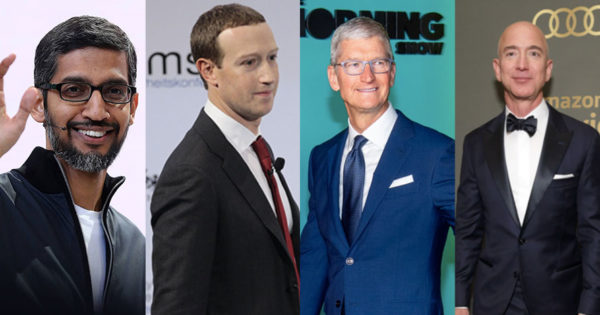
The CEOs of four of the world’s largest and most influential technology companies testified virtually today before the House Judiciary Committee’s antitrust subcommittee, arguing that they are American success stories, not too-big-to-fail corporate behemoths that stifle competition.
The five hours of questioning from lawmakers was at best wide-ranging and at worst completely disorganized and off topic. Democrats largely grilled Amazon’s Jeff Bezos, Facebook’s Mark Zuckerberg, Alphabet’s Sundar Pichai and Apple’s Tim Cook on antitrust matters, while Republicans focused largely on allegations of political bias against conservatives.
When on topic, legislators relished a rare opportunity to discuss major corporate acquisitions and press the CEOs on allegations of anticompetitive behavior in their respective product spaces. While the other tech execs had appeared before Congress, it was the first time for Bezos.
Social media market dominance
House Judiciary Chairman Rep. Jerrold Nadler, D-N.Y., interrogated Zuckerberg about Facebook’s $1 billion acquisition of Instagram in 2012—specifically his rhetoric in internal emails at the time, which cited the photo-sharing app as a threat. Nadler and other committee members alleged a pattern of anticompetitive behavior whereby Facebook identified companies that could pose a threat to its business and acquired them. New documents released by Congress today show internal emails to Zuckerberg in which its former CFO talks about acquiring companies to “neutralize a competitive threat.” Lawmakers also raised Facebook’s 2014 acquisition of WhatsApp for $19 billion and its attempted purchase of Snapchat in 2013.
“It is a violation of the Sherman Act to buy out a direct competitor to eliminate them as a danger and protect a monopoly; that idea doesn’t seem to be well understood,” tweeted the Columbia Law School professor and internet expert Tim Wu during the hearing.
Rep. Pramila Jayapal, D-Wash., also asked Zuckerberg about copying competitors’ features, which Facebook arguably did with Snapchat’s Stories and will do with TikTok’s infinite scroll and video editing features when Instagram Reels comes out this month.
“People want to be able to communicate privately and with all their friends at once,” Zuckerberg said in response. “We’re going to build the best products in all the spaces people want to stay connected with the people they care about.”
Dominance in journalism and advertising
Nadler put pressure on Zuckerberg to acknowledge the influence Facebook’s algorithms have played on news companies’ business models—specifically, that Facebook knowingly inflated video metrics in a bid to win over ad dollars. Zuckerberg denied knowing about the scandal prior to admitting it to advertisers, something initially reported by The Wall Street Journal four years ago. Facebook’s emphasis on video led to a much-discussed “pivot to video” in the news industry and, after Facebook revealed its missteps and deemphasized video in its algorithms, Nadler said, media companies laid off hundreds of journalists.
“Do you realize the harm that caused journalists across the country?” Nadler asked. Zuckerberg disagreed with the characterization, but said he knows “how important it is that the metrics we report are accurate.”
Nadler pressed Pichai to detail Google’s reach by aggregating data across its services. “Use of this data from all these companies gives you a tremendous advantage over them and over any competitor. Does the ability to make money in any way affect Google’s algorithm in terms of what news appears in a typical user’s search result?” Nadler asked. Pichai said Google’s algorithm doesn’t “take into account a commercial relationship.”
Antitrust subcommittee chairman Rep. David Cicilline, D-R.I., and Rep. Jamie Raskin, D-Md., also brought up Facebook’s struggles to root out hate speech and misinformation on the platform. Raskin mentioned the Stop Hate for Profit advertiser boycott that has targeted Facebook this month.
96 minutes to Bezos
It took 96 minutes for legislators to ask a question of Amazon’s Bezos, but when they did, they grilled him on allegations that the company used third-party seller data to quash competitors. “I can’t guarantee you that policy has never been violated,” Bezos said in a stunning admission. “I’m not yet satisfied we’ve gotten to the bottom of that.”
https://www.adweek.com/brand-marketing/5-key-takeaways-after-big-tech-ceos-testify-in-meandering-antitrust-hearing/

